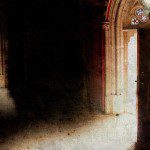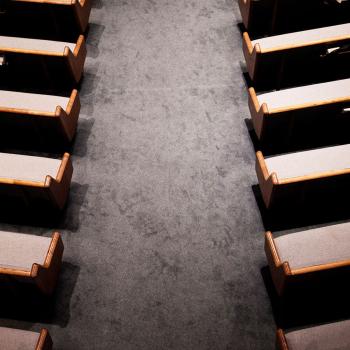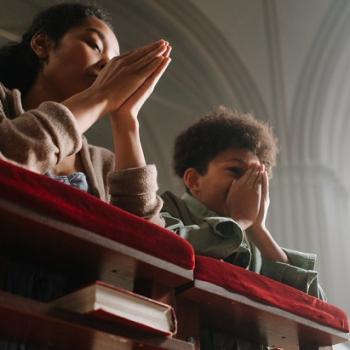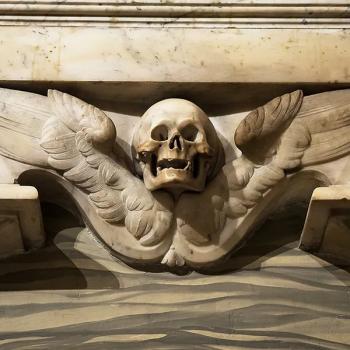![By Vassil (Own work) [CC0], via Wikimedia Commons](https://wp-media.patheos.com/blogs/sites/465/2016/06/Marriage_equality_demonstration_Paris_2013_01_27_10-300x206.jpg)
Approaching the first anniversary of “marriage equality,” I’m impelled to look back at the last year with gratitude, sadness, and prayer. I look at all that transpired, shaken by the radicality of the changes that have been made in government and in society in general. My question, which coincides with my prayer, is “are we free? what does liberation look like?” My experience of freedom is that of a work in progress, but that’s what most sinner’s who are on the path of sanctification will tell you. My experience is also ironic, especially in light of the events that took place nearly a year ago. My first encounters with politicized gay liberation culture was hardly liberating. While in the beginning it attracted me with the luster of novelty and safety, it soon became rather dull and confining. That same question, that prayer, was what distracted me from the fanfare of my brief fling with the world of LGBT politics and lured me into Christendom.
I grew up, like many a queer (same-sex attracted?) young boy, feeling like he “wasn’t really like the other boys.” The trajectory of my life from early adolescence into the beginning of undergrad models the white upper-middle class gay male metanarrative of “discovering my true identity and feeling for other boys,” so I’ll spare the reader from the boredom of hearing yet another predictable and cliche coming out story. The good part starts well into my freshman year at a Jesuit university that shall remain nameless. I was welcomed into this oh-so catholic (note-not a grammatical error) university during my orientation week by being sent to do community service at a nearby “gay church,” which also doubled as a shelter for homeless LGBT youth. We cleaned the floors of the church’s basement, alongside a winsome drag queen who was singing along with her homemade playlist of Mariah Carey and Mary J. Blige tunes. I was entranced by my first encounter with real live queer culture. I whistled along, hoping the drag queen would catch on to our shared identity (gay is as much a part of LGBT as trans, right?).
My next foray into my university’s queer culture (which was as a matter of fact very queer, more than half of the male population identified with some form of queerness) was made possible by the[student activity board] award-winning Rainbow Alliance. I shakily wandered my way into the room, my heart full of a roguish excitement and my stomach turning tricks and jumps, and found a diverse group of gay males, gender neutral persons, questioning “babies,” lipstick lesbians, self-righteous allies, and the chair of the theology department. The conversation’s focal point was the moral implications of remaining “in the closet.” LGBT students at a Jesuit university espousing a Kantian approach to moral deliberation, now that’s queer! I left the meeting with a creeping sense of guilt after I was told that it was immoral and harmful to the “community” that I never told my eight year old brother that I was gay. This feeling characterized the rest of my experiences of the “gay liberation” culture both inside and outside of my university. The more I attempted to conform to the culture’s expectations for political and ideological beliefs, modes of self-expression and dress, and attitude toward identity, I found that I was increasingly suffocated and rejected. I was told that to be free, to be truly liberated, I must conform to an extremely particular set of beliefs and lifestyle. Questions were not to be asked, and dissent would be immediately silenced and were subject to public ostracization either by official complaints to the university’s Office for Multicultural Affairs or by resorting to social media exposals. Feeling like I couldn’t keep up with such a hard-lined and strictly set moral code, I started to fall away.
This is when the question of freedom become truly dramatic and painful. What is the object of my freedom? What will allow me to be free? What will this look like? I was starting to believe that having the right to have sex with another man and to call my relationship with him a marriage, all under the guise of “being myself,” was not really the fullest realization of my yearning to be free. I wandered around the walls of my sophomore year, disillusioned and hungry, looking for something, but finding people (the university’s psychologists, classmates, my parents and family) who told me that “something” was really just a figment of my imagination and would disappear once I learned to accept myself for who I really am. I felt as if I was looked at by everybody with a sense of disappointment and pity: “if only he could learn to accept himself [according to our vision of what self acceptance looks like].” But the conditions of their expectation were too limiting. My heart wanted so much more, too much according to them.
This dim valley of confusion and disillusionment started to clear up after an encounter with a wise old professor of philosophy, and her friend, a Jesuit priest well into his 70s, whose counsel she advised me to seek. For the first time, someone was able to recognize this desire for “more” and could confirm that I was neither crazy or “immoral” for expecting more from life. For the first time, someone helped me to name this desire, to put a face to a Mystery. This Face became intelligible through the members of His Body: these two tried and true Roman Catholics. I soon discovered, as I entered more deeply into relationship with them and with other papists, that I was indeed allow to ask questions and demand more from life. My freedom, to quote Pope Saint John Paul II, was set free.
While many queer people may be told to repress and suffocate their desires for intimacy with people of the same sex, I find it hard to believe that true liberation can be realized through an ideologically constructed framework of identity and self-authenticity. Could my limited, unimaginative, and incomplete conception of “who I really am” actually set free my limitless and infinite desire for freedom and happiness? Could the possibility of developing a sexual or romantic relationship with another male and having the government recognize it on paper as a legal marriage really fulfill this relentless and overflowing yearning for meaning? Thus, I stand unconvinced by the LGBT platform’s proposal of liberation. Sure it is painful and dissatisfying to repress one’s erotic desires and sense of identity, but I’d much rather take my desires even further. Sadly, the LGBT liberation movement lacks the means to adequately apprehend the fullness of the Beauty that they encounter in the form of the human body, a Beauty which cannot fully or truly be known by mere sexual intercourse and hardly by a government document. Thus, I urge those who plan to attend the upcoming Pride events and marches, in hopes of finding liberation and the chance to authentically express their identity, to seek full liberation, rather than yet another reductive and repressive proposal of freedom. I encourage them to ask the same questions I asked: what allows me to be free? what does true freedom look like?












